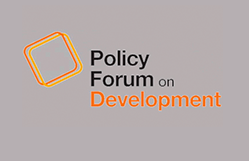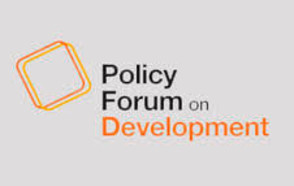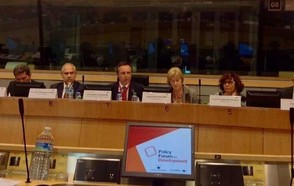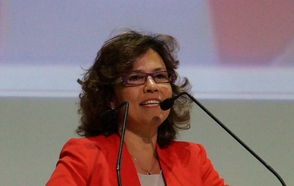
The 4th edition of Policy Forum on Development (PFD) gathered an international delegation of eighty representatives of European institutions, local authorities and civil society in Brussels from 14-16 March 2016.
If 2015 was the year in which the new development agenda was defined, then 2016 is the year the implementation starts. This was highlighted at the opening of the 4th edition of Policy Forum on Development which was attended by Jacqueline Moustache-Belle, Mayor of Victoria (Seychelles) and Co-President of UCLG representing local authority networks.
In her speech, the Mayor of Victoria introduced some of the issues planned for the agenda including a review of foreign policy and EU cooperation. She invited the EU to promote effective participation of local governments and civil society in the review process of the Cotonou Agreements.
With regard to the new foreign policy global strategy and EU security, the mayor insisted that the current refugee crisis highlights the need to review these policies, which must reaffirm core values, such as human rights, and the commitments the EU made on development policy and on the sustainable development goals. Finally Mayor Moustache-Belle stressed the importance that the Habitat III World Conference, taking place this year in Quito (Ecuador), has for the implementation of 2030 Agenda and in particular for local and regional authorities.
A strong representation of local and regional governments
Contributions to the debates were made by different members of the delegation of local authorities throughout the two and half days of discussions. Jean Pierre Elong Mbassi, Secretary General of UCLG Africa and Frédéric Vallier, Secretary General of the Council of Municipalities and Regions (CEMR) participated in the first session on the review of the Cotonou agreements, insisting on the need to develop an ambitious vision that integrates the advances of previous agreements and respects the characteristics of the different regions of the Asian, Pacific and Caribbean countries participating in the agreement.
Analysis of the Global Agenda: Habitat III and the implementation of the 2030 Agenda
The second session on the Global Agenda addressed two issues: the Habitat III Conference and the Global Partnership for Effective Development Cooperation (GPEDC, Nairobi November 2016).
In the first debate Patrick Braouezec, President of Plaine Commune (France), along with a representative of the Habitat International Coalition (HIC) stressed the need to place the right to the city, strengthening of local governance and citizen participation at the center of the New Urban Agenda.
Then, during the second debate, Edgardo Bilsky, on behalf of the UCLG World Secretariat, highlighted that local authorities will be hosting one of the preparatory workshops and will also actively participate in the Nairobi conference in order to insist on the role of local governments in implementing the principles adopted in Busan.
The next session focused on "Creating a favorable environment for the participation of civil society and local authorities in implementing the 2030 Agenda". Bernadia Tjandradewi, Secretary General of UCLG ASPAC, reiterated the need to create "multi-stakeholder" mechanisms at national level to ensure the active participation of all stakeholders in the process.
The session on the "Review of EU development policies" saw an intervention by the Mayor of the District of Bamako and president of the Association of Municipalities of Mali, Boubacar Bah and the Director of Platforma, Patrizio Fiorilli. Both reaffirmed that the 2030 Agenda must occupy a central place in European policies and will only be achievable if implemented locally.
The next steps for all stakeholders in the Forum
During the latter part of the Forum, working groups discussed the progress made during the first three years of the Policy Forum on Development and the expectations of stakeholders. Local authorities stressed the need to strengthen the quality of political dialogue among the members of the Forum. All agreed on the need to redefine objectives and specific results for each Forum. Civil society and local authorities were invited to submit a paper to the next forum on the multi-actors for the implementation of 2030 Agenda that could be discussed and disseminated within the EC in order to contribute to the development of political cooperation in this direction.
This year, two forums or regional meetings are expected to be held, one in Africa probably in September, and a regional forum in Latin America, in July or August.













